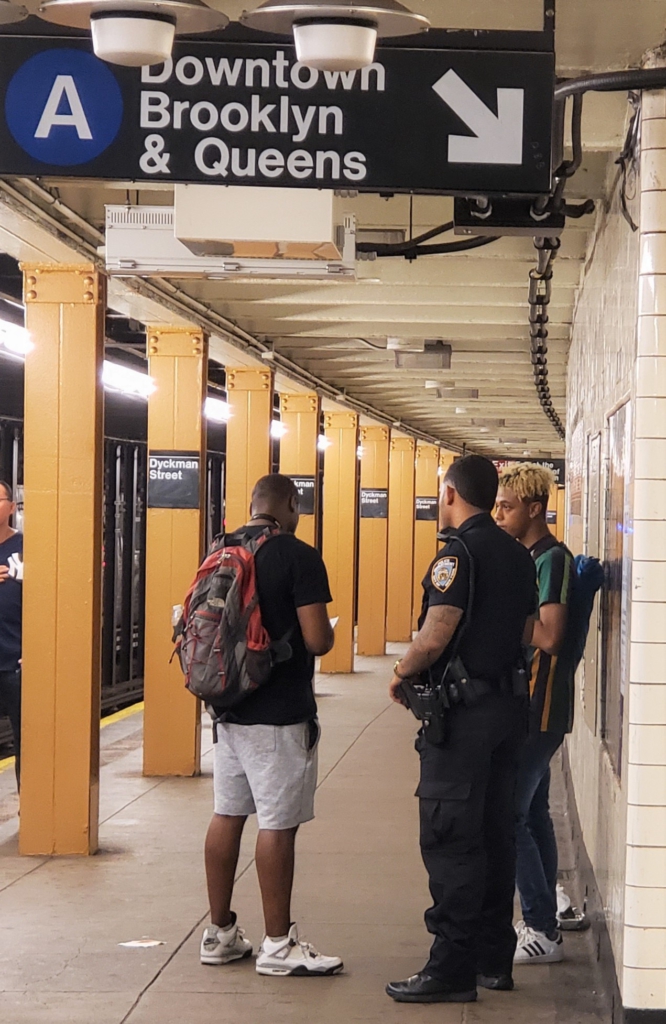
In mid-July, the heat wave in New York City broke record-temperatures causing families and young people to take to the streets in search of relief. Buckets of water that hit police officers in Harlem and Brownsville, Brooklyn, became an excuse and a rallying cry for politicians like Mayor Bill de Blasio and former Mayor Rudolph Guiliani to overpolice neighborhoods where poor and oppressed residents live in an occupation-style search for the young men who wet the cops.
This was just part of the overpolicing in that 48-hour period.
One of the many perks of being a teacher and having summers off is that I can go to the beach on weekdays. On Friday, July 26, while at Brighton Beach in Brooklyn, I saw two cops walk around the beach. They stormed across my friend’s and my beach towels towards a cotton candy vendor, a man of Latino descent. My instincts kicked in and I got up, walked towards them and took out my phone to record what was happening as an act of solidarity, to show the man working in the hot sun all day he is not alone. The recent memory of Eric Garner’s murder via choke hold at the hands of an NYPD officer who recently faced zero jail time also loomed over me.
Thankfully, others around me began to also video the police. One woman yelled, “Now we all have to go because they [the cops] will try to get all of us.” The cops wrote a ticket, and one female officer turned to mockingly wave and smile at me, I presume for recording her.
The cops walked away, and I returned to my towel. All but two minutes later, instead of two cops, I see six officers surround another cotton candy vendor. This time, however, a white man, three Latina women, and a group of Black teens united with me in recording the police and standing with the vendor. An officer approached me and said, “Oh you want my badge number? Here it is.” I raised my voice, knowing others around me were watching and said, “Why are you harassing someone for trying to make a living? Why don’t you go after murderers like Daniel Pantaleo who killed Eric Garner?” She scoffed and claimed to know “where I was going with all of this” and walked away.
In my back and forth with one officer, another man was yelled at the five remaining cops, “Go away and leave him alone!” Before the cops all left, they issued the cotton candy vendor a $100 fine. With a tired expression, the man thanked us for being there with him.

The next day was much of the same. I was in Washington Heights, making my way up to Dyckman St. with friends on a Saturday night. At 11:30 pm, as I exit the train, I see a uniformed officer and a plain clothes officer with a young man who looked no more than 16-years-old carrying worry in his face. Again, I stop to record, frustrated that this is the third time I had to do this in two days.
After a few minutes, the young man walked towards me, his eyes red, his voice trembling. My friends and I inquire about his being stopped by cops, and he explained it was for fare-beating and that he got a $100 fine. Nervously, he shared, “I tried to explain to them what happened but they wouldn’t listen, they wouldn’t even let me talk.” We walked him to the turnstiles and gave him a Metrocard [fare card-ed.] so he could get home safely. He hugged us and thanked us for looking out for him.
The Latino men selling cotton candy at the beach were doing their best to make it through the summer, just trying to survive. The beach was not packed — I doubt they had made the $100 they were fined for selling a children’s treat. I’m sure that the teenager who did not have $2.75 for the MTA fare also did not have $100 for the fine.
Recording the police or offering Metrocards will not end the criminalization of poverty, it will not end police terror. We know that. That’s not why we did it. We did it because we love our community, we love the working class, and we know that overpolicing can lead to a death sentence for Black and Brown men. I say “we” because I was not alone. Fellow New Yorkers stood with me using their phones, bodies or voices, people who know what it means to have police officers attempt to intimidate us into fear and complacency.
Solidarity. That’s the key word. Being bold in action– from taking out our phones and videoing to talking with the women at the beach who were proud that we all stood against the cops, to giving the young man a Metrocard– shows that cooperation and collective power are the basis of human instincts.
The point of it all was to inspire others to take action too. In the spirit of Fannie Lou Hamer, “We are sick and tired of being sick and tired,” and New Yorkers stepped up with me this weekend.





